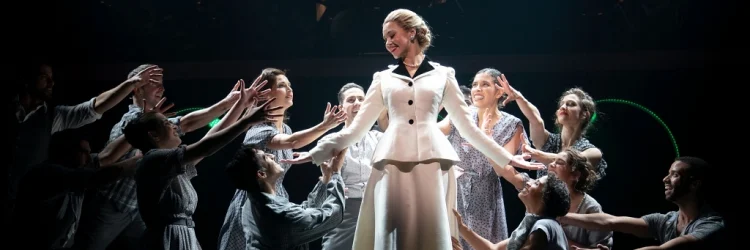Review of Evita at New York City Center
The legacy and history of the Broadway genre is defined most by its divas: Broadway's brightest and most archetypal stars have been women. They are charismatic, larger than life, and have voices that bring crowds to their knees and to their feet. Moreover, they are immense cultural properties that hold a special place in the hearts of those they reach.
Both the titular character and source material of Evita reflect this principle. Eva Perón, as a complex political figure, has endured as an international cultural icon, inspiring this very musical. Her career as an entertainer-turned-politician, with its engrossed public and cult of celebrity, was marked with as much controversy as glamour.
Perhaps it's for this reason that, in her effort to revitalize Evita for contemporary audiences at New York City Center, Sammi Cannold has us re-examine what we feel about the glitz, and the woman behind it. Cannold's heavily researched approach pervades in this new streamlined rendition. Cuts and transitions make for a trim, two-hour runtime that leaves no dull moments. At worst, it's in want of a little breathing room. Cannold's incisive truthfulness zeroes in on the uglier facets of Perón's story—behind her talent and sexual power lie trauma and victimization at a young age. Behind the champion of descamisados and women's suffrage was also the wife of Perón's oppressive regime.
All this culminates in a rendition perhaps a little darker than even the grand, emotional weight of the score is accustomed to. From the moment audiences enter the theatre, they see Perón's iconic white Dior dress: Recreated by Alejo Vietti, suspended above Jason Sherwood's piers of white roses. Like Evita's hands, they are a saintly, ethereal, almost virginal gesture. This same almost-monument is eviscerated in the end by the same ensemble that not long ago so sensationalized Evita; as her own mortality looms, and her vacillating legacies echoes to haunting chants of "Perón". The audience, watching a reduced Eva on her deathbed, with her younger counterpart in a fetal position nearby, cannot help but wonder: Are we complicit?
Cannold's storytelling is complemented by all her collaborators, and a satisfyingly Latin-dominant cast. Evita's younger self is delegated to a separate actress: Maia Reficco's supple, poppy vocals as Young Eva deftly cycle Andrew Lloyd Webber's challenging score, but without much depth of character. However, despite an early transition to Solea Pfeiffer's stellar Eva, Reficco's presence throughout the rest of the show as a haunting, introspective shadow of Eva's past is no less potent. Jason Gotay's Che is fiercely sung, but lacking the gravitas and grit of former interpreters. Maria Cristina Slye, inversely, delivers an achingly show-stealing "Another Suitcase In Another Hall." All this is under Bradley King's colorful lighting, which dabbles frequently with Eva's mortal white and a menacing, Sith Lord-esque red for the more politically charged scenes.
This distilling of an aging but timeless classic, with boldness and authenticity at its forefront, could not be truer to the directive of New York City Center.
(Photo by Joan Marcus)
WHAT THE OTHER CRITICS SAID
"Cannold's interpretation, based in part on work she did for her undergraduate thesis at Stanford, is even more analytical than Prince's. Aside from separating the dress from the woman, she has separated the woman from herself: Eva is played from age 15 through 20 by Maia Reficco and as an adult by Solea Pfeiffer. Even after the girl turns into the woman, in the middle of the song "Buenos Aires," she hovers over the rest of the action as a caution. The result, as it must be for 2019, is a more ambivalent, feminist reading of Argentina's first lady, lay saint and lightning rod. But it's also, for much of its two hours, more muddled and less engaging."
Jesse Green for New York Times
"The first Evita, Patti LuPone, was a force of nature. The latest Evita is a pretty cipher. That assessment is not a slam on Solea Pfeiffer's sly incarnation of Eva Perón. She wears the role with high-fashion hauteur in the new, insightful revival of Tim Rice and Andrew Lloyd Webber's Evita."
Robert Hofler for The Wrap
Originally published on
